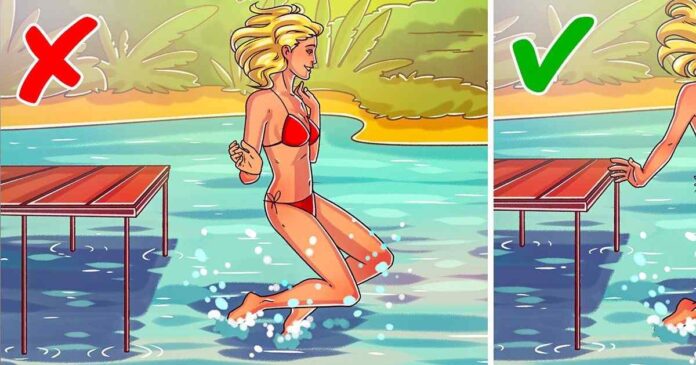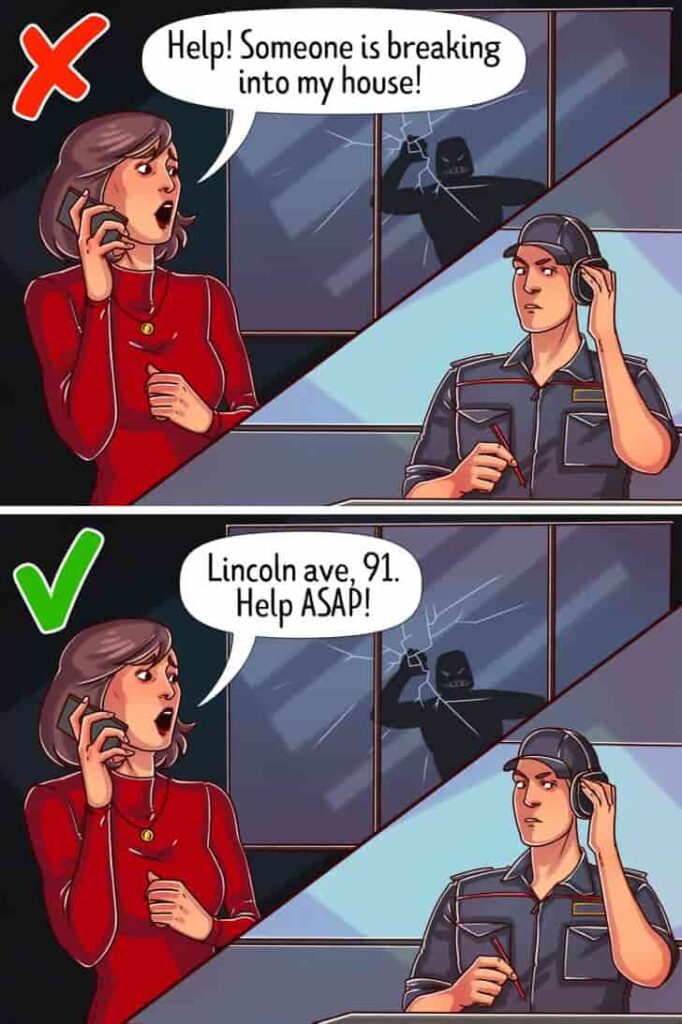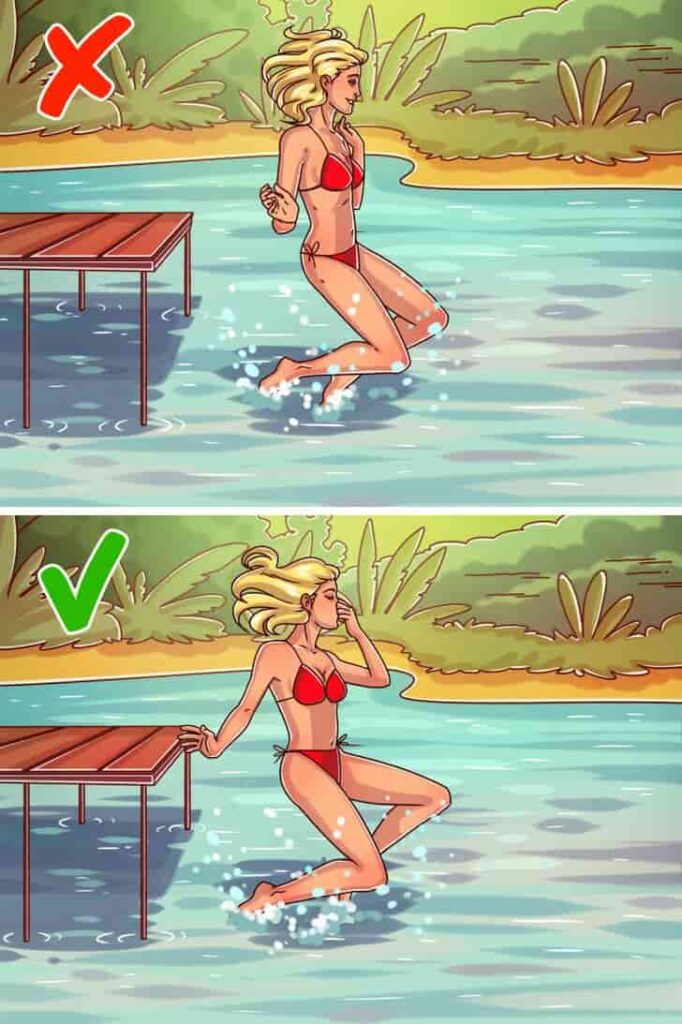
Anyone can find themselves in a situation when a great deal is on the line. Panic, taking the wrong steps in the wrong order or underestimating the gravity of the issue can all have disastrous repercussions. And it’s frequently due to a lack of understanding.
Using several different detergents

In the same room, never use bleach and other ammonia-based detergents at the same time. The mixture of gases produces the toxic gas chloramine, which can cause a variety of unpleasant symptoms and can even be harmful to your health in some situations. Window and mirror detergents frequently contain ammonia.
Dizziness under water
If you’re in a position where you don’t know where the water’s surface is and you’re submerged, blow some bubbles and see where they go. The bubbles will rise anyway, and all you have to do is keep up with them.
Being stranded in the middle of nowhere with your car
If you don’t have a way to send signals, you can utilize a spare tire from your car. The rubber smoke will be visible from several miles away, and someone will notice it. Walking far away from the automobile in search of assistance is never a good idea. Frequently, the car is discovered first, followed by the driver who died several miles away.
Oil burning on the stove

It’s advisable not to leave frying pans or deep fryers unattended while they’re on the stove. However, if a fire has already started, do not attempt to extinguish it with water; this will simply make the fire worse. It’s preferable to sprinkle baking soda on it or cover the fire with a lid, which will shut off the oxygen supply.
Identifying a drowning person
Drowning victims don’t always appear to be in distress. They don’t scream for aid or make loud noises that draw everyone’s attention to themselves. When someone is genuinely drowning, they are usually too weary to scream, and when their head rises above the water, all they have time to do is acquire enough oxygen to breathe, not to scream. The head is usually tilted back, and they keep plunging underwater over and over. Their hair is generally on their face, their eyes aren’t focused, and their movements are slow and jerky if their hair is long.
The rule of CPR
If you need to do CPR on someone who isn’t breathing, don’t stop until the ambulance arrives. If the brain is deprived of oxygen, the person has no chance of surviving. CPR is frequently performed not to bring a person back to life, but to preserve the brain until help arrives.
The bare minimum of physical strength is required.
At least one pull-up should be possible for everyone. You could be in any hazardous circumstance, such as dangling from a cliff or falling from a boat. This is the bare minimum of physical strength. The common assumption is that adrenaline will assist you and improve your power in this situation. Adrenaline, on the other hand, isn’t really beneficial. If someone can’t perform one pull-up in real life, there’s a good likelihood they won’t be able to do it in an emergency.
Calling an ambulance or the police

The first thing you must tell the operator is where you are calling from, not why you are calling. If the situation requires you to end the call, it is more important for the operator to know your location than anything else. They will then dispatch someone to the location to conduct an inspection. They won’t be able to assist you if they merely know the purpose of the call but not the location.
An unintentional run-in with a wild animal
Rabies can be spread through a wild animal’s scratch or bite. You must disinfect the wound within 10-15 days and then see a doctor right away. Every hour that passes reduces your chances of surviving. If you wait too long, this viral condition becomes very impossible to treat.
Touching an electrified object
If you touch something with the inside of your palm, the electricity will make your fist squeeze and you will be unable to escape. It is preferable to touch something with the back of the palm in this circumstance since it will be easier to withdraw the hand away.
A big thunderstorm

A common myth is that a bolt of lightning does not strike the same area twice. Because the chances of a second attack are high, attempt to stay away from the storm’s center (but don’t run). Because lightning bolts normally strike higher regions, it’s advisable to lie down in a deep spot. Remove any metal objects, as well as your cell phone. If a bolt of lightning is approaching, you will feel metal in your mouth 3-4 seconds before it strikes, and your body hair will begin to move. Sit down and place your hands on your knees with your feet against each other.
Crossing the road
If you’re crossing the street and see brilliant sunshine on a car’s windscreen, likely, the driver won’t notice you. Even if the rules suggest otherwise, it’s best to let the car pass.
Getting lost in the forest
When the mushroom season begins, the number of persons who become disoriented in the woods grows. If you discover you’ve lost your way and don’t know where to go, look for water. Unless it’s a marsh, in which case you should walk in the opposite direction, this usually signifies you should go down. Also, pay attention to the birds: if they’re flying high, they’re likely heading toward the water, and if they’re flying low, they’re likely heading away from it. A walk along some form of water reserve will nearly always lead you to a road. All you have to do now is move toward civilization once you’ve found a route.
Jumping into water from high up

If you’re jumping into a body of water with your feet forward, keep your nose closed. This is because the water could contain extremely harmful germs like Naegleria fowleri. If they get into your nose with a lot of water, they can enter your brain and cause primary amoebic meningoencephalitis, which is virtually always fatal. However, nothing will happen if you swallow these organisms.
A diabetic patient who has become unconscious
You can’t inject insulin into a diabetic patient who has lost consciousness since it could kill them. Hypoglycemia (a lack of sugar) is the most common cause of diabetic coma, and insulin will only worsen the issue. All you have to do now is call an ambulance and try to give the victim some sugar – that will help tremendously. However, if the problem is hyperglycemia (too much sugar), a little more won’t make things any worse.
Bonus: the 5-second rule
We’ve all heard (and even utilized) the rule that claims that if food has fallen on the floor for less than 5 seconds, it can still be picked up and consumed without putting your health at risk. According to many studies, bacteria, on the other hand, are unlikely to follow this rule. Some scientists believe that the risk is low, but that doesn’t mean it’s risk-free.
Has this ever happened to you or a family member? What else would you suggest?
